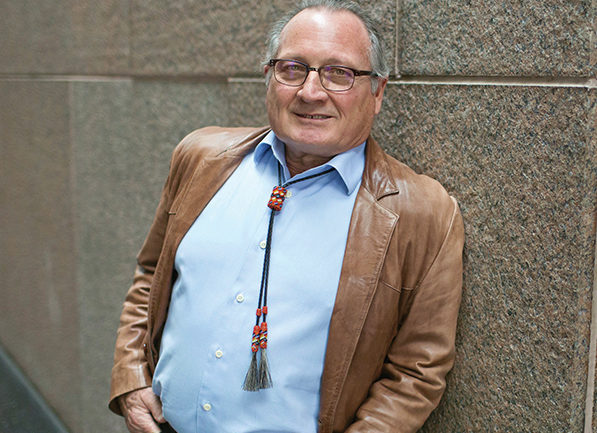
Special promotional content provided by Wisconsin Alzheimer’s Disease Research Center
Dr. Neil Henderson speaks regularly on Alzheimer’s disease and other forms of dementia, and often, he shows a picture of what he calls “the origin of Alzheimer’s disease” — the aisle of a grocery store.
“The linkage from there is too much food, too much bad food, metabolic dysfunction leading to diabetes leading to a heavy load of vascular dementia,” says Henderson, Executive Director of the Memory Keepers Medical Discovery Team on Health Disparities at the University of Minnesota Medical School, Duluth campus.
Henderson will speak Wednesday, October 23, at a free community event to share recent findings in the study of healthy aging, brain health, and Alzheimer’s disease prevention. Topics for the event, which is hosted by the Wisconsin Alzheimer’s Disease Research Center, will focus on the theme of New Frontiers in Alzheimer’s Disease Research. The event, which is free and open to the public, will take place from 5:00 to 8:00 p.m. at Gordon Dining & Event Center, 770 West Dayton Street in Madison.
Henderson, who is a member of the Oklahoma Choctaw Nation, earned his doctoral degree from the University of Florida and spent 20 years at the University of South Florida College of Medicine at the Suncoast Gerontology Center, in the 1980s when dementia research was just getting started.
“Then I started doing dementia research with my own tribe, the Oklahoma Choctaw tribe,” Henderson says. “So I moved back to Oklahoma and was at the University of Oklahoma Medical Center and I was there 12 or so years, and this position at the University of Minnesota came to my awareness and it allowed me to put together everything I’d done in my career from the dementia part and the diabetes part with American Indian people. So I was willing to not retire and continue on it here. I kind of forgot to retire somehow now that I think about that.”
Henderson works in medical anthropology, meaning the effects of culture on health.
“It could be cultural beliefs, but it could also be the physical environment where somebody is and where that life takes place. It could be related to income, access to care. All of these things are not germs or viruses, but they are clearly connected to producing disease,” Henderson says.
Specifically, Henderson has worked on the link between diabetes and dementia.
“We do know that diabetes increases the risk for Alzheimer’s disease and other dementias,” he says. “It doesn’t mean that if somebody’s got Type 2 diabetes, they will get Alzheimer’s disease. It means it increases the risk if the case is not managed well.”
And in too many cases, diabetes is not well managed — especially in marginalized populations, like Native American communities.
“We know there’s way too much obesity and diabetes across the entire country, but in Indian country, the amount of diabetes is almost three times that found in the majority population,” Henderson says. “Combine that with the fact that native people, and others, are living longer than they ever have before. That exposure to time and the possibility of bad management of diabetes increases the risk for the capillaries in the brain to become dysfunctional because of the diabetes, and the ability to clear out waste products in the brain means those toxins build up in the brain and can kill brain cells. And the outward clinical result of that is a person who is confused — can’t think well and can’t remember well — we call that dementia.”
“The field of Alzheimer’s disease research is progressing rapidly and twisting down new roads to bring us clues about how this disease starts, how it progresses, and how we can prevent it,” says Dr. Sanjay Asthana, director of the Wisconsin ADRC and professor of medicine (geriatrics) at the UW School of Medicine and Public Health. “The Annual Fall Lecture allows us the chance to report back to the community about the science behind brain health so they can use that information to take steps toward healthy aging and dementia prevention in their own lives.”
Beginning at 5:00 p.m., a Healthy Aging Resource Fair will feature representatives from the UW Health Wellness Center, Aging & Disability Resource Center of Dane County, the Alzheimer’s & Dementia Alliance of Wisconsin, the Alzheimer’s Association, and a number of other service organizations and resources for patients with dementia and their families and caregivers.
Henderson will speak at 6:00 p.m. Two speakers from the University of Wisconsin School of Medicine and Public Health will also offer Alzheimer’s disease and dementia-focused presentations. Dr. Barbara Bendlin, associate professor of medicine (geriatrics) and an Alzheimer’s disease researcher at the UW, will present her work on the microbiome and gut-brain health connections. Dr. Nathaniel Chin, assistant professor of medicine (geriatrics) and a memory care doctor at UW Health, will discuss how new discoveries in the field of Alzheimer’s disease research are changing the way doctors and scientists define the disease.
Carol Koby, host of the radio programs “All About Living” and “Living Minutes” on HANK AM 1550 and 97.7 FM, will emcee the event.
The evening will conclude with an audience question and answer session.
The event is free and open to the public. Registration is not required, but it is appreciated. For registration, event details, and parking, visit the event website.



